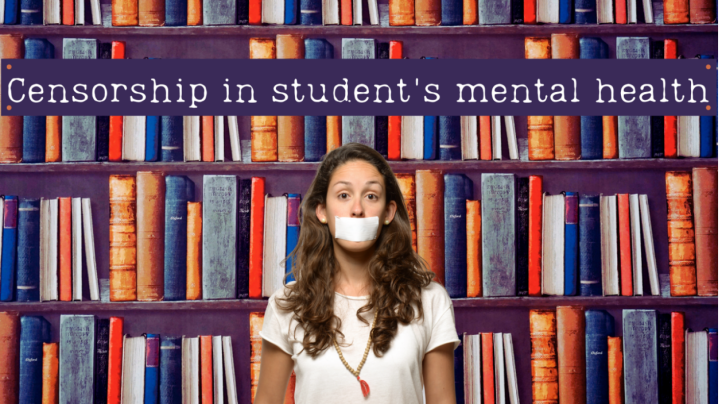13-9, 2 Rio Tower, Persiaran Rio, Bandar Puteri, 47100 Puchong, Selangor, Malaysia.

Censorship of Mental Health in Malaysian Educational Setting
We are probably quite used to hearing the importance of mental health, to focus on our mental health as they are as equally important as our physical health and so on as an individual. But what about the mental well-being of our children, students, our next generation that will be the deciding factor of the future of this country? Mental health among students is not being discussed enough in Malaysia and many of us are not fully aware of the mental health issues in our Malaysian school setting. Usually, the word “Mental Health” itself is being strongly stigmatized in Malaysia, especially in the educational setting among primary and secondary schools in Malaysia. For instance, even the slight mention of the word “mental health” will turn the heads of people, shining a judging glance at the individual, condemning them from head to toe, wondering if they are sick or belong in the mental asylum.
A nationwide survey by the Ministry of Health (MOH) conducted across schools in Malaysia has found that Malaysian teens aged 13 to 17 are critically suffering from mental health problems (MOH, 2017). The same survey also identified a trend for the prevalence of suicidal thoughts of 10% among the students who took part in the survey, which has increased by almost 3% from 7.9% as compared to 5 years ago in 2012. Some other study has also highlighted the abnormally high rate of stress, depression, and anxiety among students in Malaysia (Ishak, Ahmad & Omar, 2020; IBCCES, 2021; Kotera, Ting & Neary, 2020). These are just a few of the examples identified and documented through the survey or research, but what about those who are not being reported?
In conjunction with the World Mental Health Day 2021, which highlighted the importance of mental health in an unequal world, it is also important to mention the elephant in the room, which is the fact that most issues stem from the fundamental basis of education. As such, if students are being educated from a young that mental health issues are to be taken seriously, and can happen to everyone, as well as how to support and identify those around them who are feeling down or are having the symptoms of experiencing certain mental health distress, I believe the mental health stigma in Malaysia will be significantly reduced. In short, to normalize the notion of mental health among young students by giving equal rights to mental health services even in the educational setting.
Moving on from the statistics part that painted a picture of how the situation in Malaysia is now, but how has the structure of public schools in Malaysia exacerbated the mental health issues of our students? According to an interview done by New Straits Times, a school counselor mentioned that the negative perception of mental health and the poor help-seeking attitude amongst students is one of the main reasons mental health issues skyrocketed in the past decade. Students are getting bullied or boycotted because of the idea that those with mental health issues are “gila” or crazy, which worsens the help-seeking tendency among those who really need help, as they are afraid of being stigmatized by their peers and teachers. Some studies mentioned that if students are not getting the appropriate help needed to address these mental health issues, it will eventually lead to an increase in the rate of social behavioral problems, poor academic performances, low self-esteem, low concentration, poor decision-making skills, and more, which exacerbated the issues they are facing, forming a negative cycle in their life (Clark & Rieker, 1986; Shapiro, Shapiro & Schwartz, 2000; Hashim, Freddy, & Rosmatunisah, 2014).
Now that we have addressed the underlying issues as an individual of the society, but did the government do something to target these issues? The Malaysian government slowly realizes the significance of mental health in all aspects of life and has been advocating and promoting the importance of mental health throughout the decade. For instance, the Malaysian Ministry of Health (MoH) had pushed a program called MOH Crisis Preparedness and Response Center led by Dr. Nur Ashikin which supported those in need and at the same time collected and provided valuable data to the MOH on important statistics on the current situation in Malaysia. Additionally, with the uprising of the Covid-19 cases, it had led to an upsurge of NGOs and some private mental health centers providing mental health supports and infographics on how to identify those who are suffering from mental health issues. From this, we can see that different parties in Malaysia are advocating and acknowledging that mental health is important and to be taken seriously. However, as a policymaker, what they can improve on is by investing more in the mental health infrastructure as we, Malaysia, are still in the developing stage in terms of mental health services and acceptance. In this sense, the government can be the advocating voice to actively promote mental health through the integration of mental health awareness in the children’s education such as providing psychoeducation in schools and destigmatizing mental health issues. Another key point that the Malaysian government can do to promote the importance of mental health is by rewarding and nurturing licensed mental health practitioners by providing them with more career opportunities such as placement in schools and government bodies.
So what can I do as a parent or teacher?
Being in the educational setting or being a parent means that we are responsible for the moral and developmental upbringing of the children, but before lending our helping hand to them, we need to scrutinize ourselves first, do we have the capacity to identify and help those in need? To tackle this as an educator, it is important to acknowledge the limitations of mental health access in the school setting and get training to develop the understanding of mental well-being and mental health to identify students that need help. Identifying children at risk is a really crucial step to helping them, as it would potentially change their whole lives and save them from spiraling down into the abyss. To prevent this from happening, it is also important to work with external parties, such as the parents and mental health professionals, to seek necessary guidance and support. Through education and staff development, it can simultaneously be promoting the mental well-being balance for the staff in the educational setting too, especially amidst this Covid-19 pandemic and advocating good work-life balance and accessible mental health support to look after their own well-being. Furthermore, we should always keep an eye and ear on our children, to be there actively for them. Sometimes when they are having trouble finding someone to talk to, it is the responsibility of you to be there for your student, for them to seek solace in your presence.
To summarize these, it is always important to have awareness and to acknowledge the limitations of our current mental health sector in order to improve our current status in Malaysia. What we can do is to promote the destigmatizations of mental health in Malaysia, especially in the educational settings. To achieve this, all parties must work together hand-in-hand with each other to reach a consensus and strive for a better future for our next generation. As an educator or parent, it is important to always constantly keep an open mind on the issues of mental health and not to be afraid of seeking help from professionals because you will be the one deciding the future of your child and the future of our nation because you might never know, your action today might be the deciding factor of your student’s tomorrow.
References
- https://www.google.com/url?q=https://iku.moh.gov.my/images/IKU/Document/REPORT/NHMS2017/NHMS2017Infographic.pdf&sa=D&source=editors&ust=1633775962692000&usg=AOvVaw3wZA3bNRqqeyAQ8HX1wErc
- https://www.google.com/url?q=https://www.easyuni.my/en/advice/malaysian-teens-mental-health-2444/&sa=D&source=editors&ust=1633775962674000&usg=AOvVaw25-EKJLH1GqjKESuuwqkUJ
- https://www.google.com/url?q=http://www.hrpub.org/download/20201130/UJER30-19520422.pdf&sa=D&source=editors&ust=1633775962693000&usg=AOvVaw2hdrMnnt3xO6HLj4LuuuUS
- https://www.google.com/url?q=https://ibcces.org/blog/2019/05/01/impact-anxiety-depression-student-progress/%23certifications&sa=D&source=editors&ust=1633775962694000&usg=AOvVaw19T5S6DWRexVYUWdm03Jxa
- https://www.google.com/url?q=https://link.springer.com/article/10.1007/s10734-020-00547-w&sa=D&source=editors&ust=1633775962694000&usg=AOvVaw0DRDvAlu5stVuwcIY5cEYR
- https://www.google.com/url?q=https://wfmh.global/2021-world-mental-health-global-awareness-campaign-world-mental-health-day-theme/&sa=D&source=editors&ust=1633775962695000&usg=AOvVaw364RssYYSzjXXOAtJTjme5
- https://www.google.com/url?q=https://www.nst.com.my/education/2020/02/566671/top-3-challenges-students&sa=D&source=editors&ust=1633775962692000&usg=AOvVaw31ag6x70ZJ-cVbG67jJITU
- https://www.google.com/url?q=https://psycnet.apa.org/record/1987-05364-001&sa=D&source=editors&ust=1633775962691000&usg=AOvVaw3rghX199lWkvIctEl5D9jF
- https://www.google.com/url?q=https://journals.lww.com/academicmedicine/Fulltext/2000/07000/Stress_Management_in_Medical_EducationTable_1__A.23.aspx&sa=D&source=editors&ust=1633775962691000&usg=AOvVaw3vGAxWPixeyOzpLWYljJFd
- https://www.google.com/url?q=https://doi.org/10.1123/jpah.9.7.1012&sa=D&source=editors&ust=1633775962688000&usg=AOvVaw04zURWsk92gPdRxW8wIlgJ







